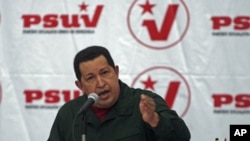The State Department said Monday that Venezuela's rejection of the Obama administration's choice for U.S. ambassador to Caracas will have "consequences" for the bilateral relationship. Venezuela confirmed that it will not allow veteran U.S. diplomat Larry Palmer to take up the ambassadorial post.
The State Department says Venezuela's rejection of ambassadorial nominee Palmer will have a tangible impact on already-strained U.S.-Venezuela relations. It is not revealing, however, what the consequences might be, saying that any decision will await further evaluation by the Obama administration.
Venezuela climaxed a months-long dispute over Palmer by summoning the U.S. charge d'affaires to the foreign ministry on Monday and giving her a note announcing that it is withdrawing its original acceptance of Palmer's posting to Caracas.
The government of Venezuelan President Hugo Chavez initially granted what is known as an agre'ment for Palmer, who was nominated for the post by President Barack Obama in June.
But officials in Caracas later said Palmer could not take up his post because of comments he made at his Senate confirmation hearing that morale in the Venezuelan military is low and that members of the Chavez government had ties to leftist Colombian rebels.
Earlier this week, President Chavez said Palmer had disqualified himself with the remarks and that he could not function as ambassador.
At a news briefing, State Department Spokesman P.J. Crowley said Venezuela is within its rights to reject Palmer, but that the action has consequences for the bilateral relationship. He said Palmer, a former U.S. ambassador to Honduras, was chosen for the Caracas post because of personal qualities that could help repair the troubled U.S.-Venezuela ties.
"We regret this action taken by the Venezuelan government and it will bear responsibility for that action," said Crowley. "We believe that precisely because there are tensions in the relationship, it was important to maintain diplomatic communications at the highest level. President Obama nominated Larry Palmer to serve as ambassador to Venezuela because he has a unique combination of experience, skill and wisdom to successfully represent our nation in Caracas. And we have never wavered in that view."
Crowley would not be specific about what the consequences of the Venezuelan decision might be.
Asked whether that country's ambassador in Washington might be expelled, a senior official here would say only that there is a variety of things the Obama administration might do.
The United States and the populist Venezuelan leader have had a difficult relationship dating back to early in the previous Bush administration.
The State Department last week strongly criticized Chavez for seeking rule-by-decree powers from the country's outgoing national congress, preempting possible rejection of the move by the newly-elected legislature, which will have many more opposition members.
US: Venezuela's Rejection of Washington Envoy Will Have 'Consequences'
